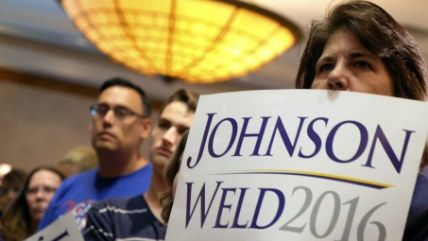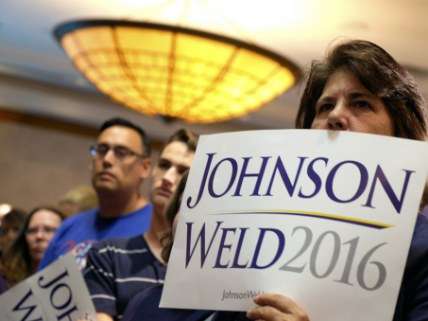If Johnson Gets 5 Percent of the Vote, Would the Libertarian Party Take FEC Money?
It may be a focus of debate among delegates in 2018.


If current polling numbers hold, the Libertarian Party could surpass an important vote share threshold come November.
If Gary Johnson and Bill Weld receive at least five percent of the popular vote, they'll be officially classified as a "minor party" by the Federal Election Commission (FEC). If that happens, the Libertarian Party's candidate in 2020 would qualify for public matching funds based on how much of the vote they receive.
At RealClear politics, Bill Scher takes note of the possibilities:
If Johnson snags 5 percent of the national popular vote, the Federal Election Commission will classify the Libertarians as an official "minor party," granting the 2020 nominee a lump sum of cash for the fall campaign, courtesy of the American taxpayer. (And don't you think for a second that the vehemently anti-big-government Libertarians won't cash that big government check in a heartbeat.)
The exact amount of federal funds depends on the size of his vote, but Green Party officials – who have been chasing 5 percent for years – estimate that meeting the threshold would yield about $10 million. That may seem like chump change compared to the hundreds of millions of dollars major party presidential nominees routinely raise. But Johnson has gotten this far after raising only $8 million through August. The prospect of knowing the Libertarian Party's nominee is guaranteed $10 million will allow him or her to hit the campaign trail running, improving the odds of getting into the debates, winning an even larger share of vote and fortifying the party's place in the American political landscape.
Isn't it a little bit odd for Scher to assert what the Libertarian Party would do in a snarky parenthetical aside rather than simply contacting them to ask? Scher's hardly an objective observer of the election from his home at liberaloasis.com. That's certainly no sin (read about my own lack of objectivity here), but it took me no time at all to contact the Libertarian Party and talk to party chair Nicholas Sarwark.
The reality is, according to Sarwark, members of the Libertarian Party are not in agreement over whether to take the money, and it will have to be something hammered out if Johnson actually reaches the threshold. (Keep in mind this FEC fund Scher describes is made entirely from voluntary donations from taxpayers. The FEC notes in its guidelines "Money for public funding of presidential elections can come only from the Presidential Fund. If the Presidential Fund runs short of funds, no other general Treasury funds may be used.")
"We would be delighted to have that conversation," Sarwark told Reason. "Right now we're just entirely focused on the election and having Johnson do as well as possible."
In the event Johnson reaches the FEC vote threshold, Sarwark believes the most likely outcome will be that delegates to the Libertarian Party's 2018 national convention would need to hammer out a possible bylaw about whether a potential candidate should be permitted to accept the money. As a legal matter, Sarwark notes, it's the candidate who decides whether to take the money, not the party. So the bylaw would serve the purpose of attempting to bind a future candidate to the party's attitude toward whether to accept the grant.
Another potential concern is that accepting the grant actually imposes a limit on fundraising by the candidate as part of matching these funds. While it might, at the moment, appear to be a boon for whoever comes after Johnson (it certainly was for Pat Buchanan following after Ross Perot with the Reform Party), if this Republican Party crack-up continues and more people see the Libertarian Party as an alternative, it actually might not be in the party's interest to tie themselves down this way. There's a reason the Democrats and the Republicans don't avail themselves of this money anymore. Neither party has accepted any grants for the general election as yet, and the only primary candidate to accept matching funds was Martin O'Malley.
Voluntary participation in the program has also plunged, according to the FEC, dropping from nearly 30 percent of returns in 1980 to a little over 5 percent of returns in 2015. That's an interesting lesson right there for folks who want to demand public funding for elections. These folks aren't putting their money where their mouths are.
